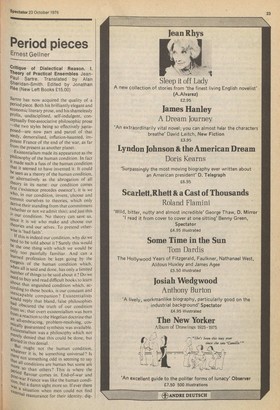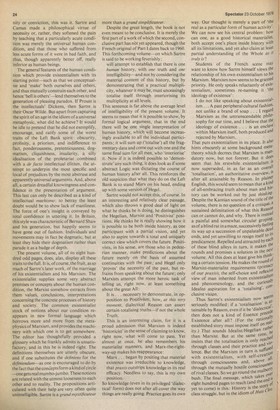Period pieces
Ernest Gellner
Critique of Dialectical Reason. I. Theory of Practical Ensembles JeanPaul Sartre. Translated by Alan Sheridan-Smith. Edited by Jonathan Flee (New Left Books £15.00) Sartre has now acquired the quality of a Period piece. Both his brilliantly elegant and economic literary prose, and his shamelessly prolix, undisciplined, self-indulgent, conceptually free-associative philosophic .prose —the two styles being so effectively AxtaPosed—are now part and parcel of that seedy, demoralised, inflation-haunted, imPotent France of the end of the war, as far from the present as another planet.
Existentialism made its appearance as the Philosophy of the human condition. In fact it made such a fuss of the human condition that it seemed to have invented it. It could be seen as a theory of the human condition, or alternatively as the abrogation of all theory in its name: our condition comes first (existence precedes essence'), it is we who, in our condition, invent, choose and commit ourselves to theories, which only derive their standing from that commitment (.Whether or not we admit this); and just this tA: our condition. No theory can save us, since it is we who make and choose our theories and our selves. To pretend otherwise is 'bad faith'. If this is indeed our condition, why do we need to be told about it ? Surely this would be the one thing with which we would be ?nlY too painfully familiar. And can a learned profession be kept going by the exegesis of the human condition which. When all is said and done, has only a limited number of things to be said about it ? Do we ne, ed to buy and read difficult books to learn doout that anguished condition which, acFording to those books, is our constant and IneseuPable companion? Existentialists w, °old reply that bland, false philosophies Ifidd obscured the truth of our condition r°nPm us; that overt existentialism was born ,) a reaction to the Hegelian doctrine that cin ail-embracing, problem-resolving, cosrPc.4115, guaranteed synthesis was available. ;7>ustentialism was a philosophy which not 1,erely denied that this could be done, but gloried in this denial. w,Elut Ought not the human condition, thnatever it is, be something universal ? Is there not something odd in seeming to say1.114t all conditions are human but some are t,:r.e so than others? This is where the Per SO flavour comes in. End-of-war and tiost-war France was like the human condi n' but a damn sight more so. If ever there exls a situation when men could not find erbal reassurance for their identity, dig
nity or conviction, this was it. Sartre and Camus made a philosophical virtue of necessity or, rather, they softened the pain by teaching that a particularly acute condition was merely the universal human con dition, and that those who suffered from less acute forms of it were in bad faith, and thus, though apparently better off, really inferior as human beings.
The generefeatures of the human condition which provide existentialism with its starting point—such as that we conceptualise and 'make' both ourselves and others, and thus mutually constrain each other, and hence 'hell is others'—lend themselves to the generation of pleasing paradox. If Proust is
the intellectuals' Dickens, then Sartre is their Oscar Wilde. But apart from capturing the spirit of an age in the idiom of a universal metaphysic, what did he achieve? Et would be idle to pretend that he did not exemplify, encourage, and ratify some of the worst traits of the Left Bank spirit : obscurity, prolixity, a priorism, and indifference to fact, ponderousness, pretentiousness, dogmatism, cliquishness, insularity, a silly idealisation of the proletariat combined with a de facto intellectual elitism, the attempt to underpin the most specific and local of prejudices by the most abstruse and apparently universal arguments. And, above all, a certain dreadful knowingness and confidence in the presentation of argument. This last can only be described as a kind of intellectual machismo: to betray the least doubt would be to show lack of manliness. The force of one's insight is conveyed by total confidence in uttering it. In Britain, this style was characteristic of Bernard Shaw and his generation, but happily seems to have gone out of fashion. Individuals and movements may in fact be dogmatic, but at least they hide their dogmatism rather than parade it as a badge of depth.
The present volume, all of its eight hundred odd pages, does, alas, display all these traits to the full. It is, of course, the fruit, as so much of Sartre's later work, of the marriage of his existentialism and his Marxism. The existentialist supplies some very abstract premises or concepts about the human condition, the Marxist somehow extracts from them values, conclusions, interpretations concerning the concrete processes of history and society. The common existentialist stock of notions about our condition reappears in new formal language which borrows more and more from the metaphysics of Marxism, and provides the machinery with which one is to get somewhere. The editor has thoughtfully provided a glossary which he frankly admits is unsatisfactory, and in this he is indeed right. The definitions themselves are utterly obscure, and if one substitutes the definiens for the definiendum—as one is encouraged to do by the fact that the concepts form a kind of circle —onegets real mum bo-jum bo. These notions are related with the utmost looseness to each other and to reality. The propositions articulated with their help are very often quite unintelligible. Sartre is a grand mystificateur more than a grand simplificateur.
Despite the great length, the book is not even meant to be conclusive. It is merely the first part of a work of which the second, conclusive part has not yet appeared, though the French original of Part I dates back to 1960. This forthcoming volume—on which Sartre is said to be working feverishly :
will attempt to establish that there is one human history, with one truth and one intelligibility—and not by considering the material content of this history, but by demonstrating that a practical multiplicity, whatever it may be, must unceasingly totalise itself through interiorising its multiplicity at all levels.
This sentence is far above the average level of intelligibility of the present volume. It seems to mean that it is possible to show, by formal logical argument, that in the end there will be one single interpretation of human history, which will become increasingly available to all the individual participants; it will sum up ('totalise') all the fragmentary data and come out with one and the same final sum for all men, who 'interiorise' it. Now if it is indeed possible to 'demonstrate' any such thing, it does look as if some abstract Logic was dictating the course of human history after all. This reinforces the old suspicion that what they do on the Left Bank is to stand Marx on his head, ending up with some version of Hegel.
Sartre would not accept this, of course. In an interesting and relatively clear passage, which also throws a good deal of light on what he thinks he is doing, he distinguishes the Hegelian, Marxist and Positivist' positions. He thinks he is really showing how it is possible to be both inside history, as one participant with a partial vision, and yet also to aspire towards a total and uniquely correct view which covers the future. Positivists, in his sense, are those who in pedestrian manner, make predictions about the future merely on the basis of assumed continuities with the past; and Hegel only 'proves' the necessity of the past, but refrains from speaking about the future; only Marxists attempt the more heroic task of telling us, right now, at least something about the great All :
It is . . . necessary to demonstrate, in opposition to Positivism, how, at this very moment, dialectical Reason can assert certain total ising truths—if not the whole Truth.
This is an interesting claim, for it is a proud admission that Marxism is indeed 'historicist' in the sense of claiming to know, right now, what will come to pass. Yet almost at once, he also remembers his materialist manners, and Marx-the-rightway-up makes his reappearance:
Marx . . . began by positing that material existence was irreducible to knowledge, that praxis outstrips knowledge in its real efficacy. Needless to say, this is my own position.
So knowledge (even in its privileged 'dialectical' form) does not after all cover the way things are really going. Practice goes its own
Spectator 23 October 1976 way. Our thought is merely a part of 'the real as a particular form of human activity'. We can now see his central problem : how can one, as a good historical materialist, both accept one's place inside history with all its limitations, and yet also claim at least partial understanding of the Whole as truly is?
Students of the French scene maY want to know how Sartre himself views the relationship of his own existentialism to his Marxism. Marxism now seems to be granted priority. He only speaks reluctantly of existentialism, sometimes re-naming it 'the ideology of existence':
do not like speaking about existential ism ... A past peripheral cultural fashion. not unlike a brand of soap . . . I regard Marxism as the untranscendable philosophy for our time, and I believe that the ideology of existence . . is an enclave within Marxism itself, both produced and rejected by Marxism.
That puts existentialism in its place. It also hints obscurely at some background meta theory which decrees that Marxism is man" datory now, but not forever. But it does seem that his erstwhile existentialism is now superseded, in as far as an overall 'totalisation', an authoritative overview, iS after all attainable by Reason. In Plaine; English, this would seem to mean that a kino of all-embracing truth about man and history can be worked out by just thinking. Despite the Kantian sound of the title of the volume, there is no question of a critique, sustained delimitation of what this Reas011, can or cannot do, and why. There is inste0 a painful and somewhat circular groping' as of a blind rat in a maze, successively feeling its way up a succession of unpalatable dead ends, and yet unwilling to resign itself to its predicament. Repelled and attracted byeach of these blind alleys in turn, it makes the rounds and promises a solution in the riOl volume. All this does at least give his think:. ing a certain tension. He makes the round ot Marxist-materialist requirements (primacY of our praxis), the self-choice and reflexive view of man inherited from existentialist.° aidnedalipstheansopmiraetnioolnogry, or aand lottahrisincguriocu:nlY. clusive vision. Thus Sartre's existentialism now seals seriously modified : if a 'totalisation' tamable by Reason, even if it be'dialecticae then does not a kind of Essence precec! Existence after all ? (For the rationaliY established story must impose itself on rea_l: ity.) That sounds Idealist/Hegelian rattf" than Marxist. But at the same time. tic insists that the totalisation is only reacheod, through classes and their practice ane, d vi lence. But the Marxism in turn is suffu.s riu 30 with existentialism, with self-cr00 ea , through consciousness and, above _ through the mutually hostile consciousness of rival classes. So we go round the mulberi?" bush. The final message, which takes ori's eight hundred pages to reach (and the en _f yet to come) is this: History is the st.ocrYious, class struggle, but in the idiom of Hills











































 Previous page
Previous page